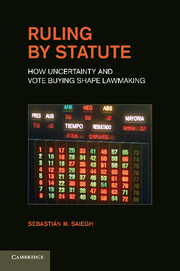10 - Conclusions
Published online by Cambridge University Press: 03 May 2011
Summary
The general who wins the battle makes many calculations in his temple before the battle is fought. The general who loses makes but few calculations beforehand.
–Sun TzuShortly after the end of the summer of 2008, as I was working on this book, I received an e-mail from Adam Przeworski. It was Monday, September 29, 2008 at 2:24 p.m. EST, and the U.S. House of Representatives had just rejected the Bush administration's $700 billion economic rescue plan. As a long-time friend and mentor, Adam was keenly aware of the event's overlap with this research project. His message read:
… Bombshell! The president and the majority opposition party support the bill and it fails. You must be happy theoretically, although perhaps less so financially …
As it is often the case, he was correct. The bill's rejection validated the theoretical underpinning of statutory policy making discussed in this book.
The fact that a piece of legislation sponsored by the White House failed in Congress was not particularly noteworthy. After all, U.S. presidents typically achieve less than 70 percent of their legislative agenda approved by Congress. And Bush himself had failed on 22 percent of the roll calls where his administration had adopted a clear position. What made this event so notable was its tremendous financial and political consequences. The bill's rejection wiped out $1.2 trillion in stock market wealth – eclipsing the size of the proposed bailout package.
- Type
- Chapter
- Information
- Ruling by StatuteHow Uncertainty and Vote Buying Shape Lawmaking, pp. 177 - 184Publisher: Cambridge University PressPrint publication year: 2011

